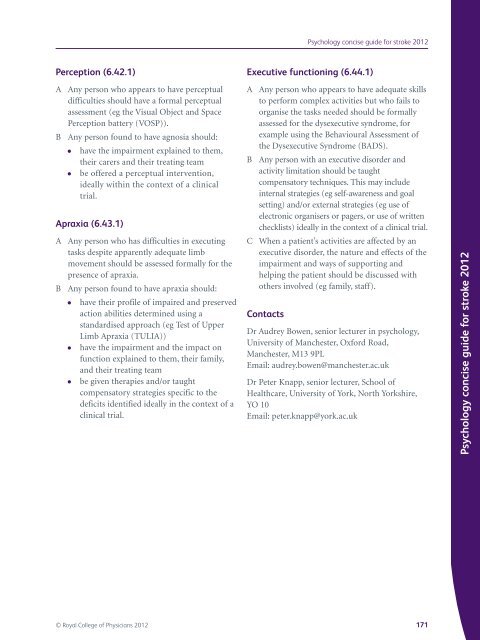national-clinical-guidelines-for-stroke-fourth-edition
national-clinical-guidelines-for-stroke-fourth-edition
national-clinical-guidelines-for-stroke-fourth-edition
You also want an ePaper? Increase the reach of your titles
YUMPU automatically turns print PDFs into web optimized ePapers that Google loves.
Perception (6.42.1)<br />
A Any person who appears to have perceptual<br />
difficulties should have a <strong>for</strong>mal perceptual<br />
assessment (eg the Visual Object and Space<br />
Perception battery (VOSP)).<br />
B Any person found to have agnosia should:<br />
● have the impairment explained to them,<br />
their carers and their treating team<br />
● be offered a perceptual intervention,<br />
ideally within the context of a <strong>clinical</strong><br />
trial.<br />
Apraxia (6.43.1)<br />
A Any person who has difficulties in executing<br />
tasks despite apparently adequate limb<br />
movement should be assessed <strong>for</strong>mally <strong>for</strong> the<br />
presence of apraxia.<br />
B Any person found to have apraxia should:<br />
● have their profile of impaired and preserved<br />
action abilities determined using a<br />
standardised approach (eg Test of Upper<br />
Limb Apraxia (TULIA))<br />
● have the impairment and the impact on<br />
function explained to them, their family,<br />
and their treating team<br />
● be given therapies and/or taught<br />
compensatory strategies specific to the<br />
deficits identified ideally in the context of a<br />
<strong>clinical</strong> trial.<br />
Executive functioning (6.44.1)<br />
A Any person who appears to have adequate skills<br />
to per<strong>for</strong>m complex activities but who fails to<br />
organise the tasks needed should be <strong>for</strong>mally<br />
assessed <strong>for</strong> the dysexecutive syndrome, <strong>for</strong><br />
example using the Behavioural Assessment of<br />
the Dysexecutive Syndrome (BADS).<br />
B Any person with an executive disorder and<br />
activity limitation should be taught<br />
compensatory techniques. This may include<br />
internal strategies (eg self-awareness and goal<br />
setting) and/or external strategies (eg use of<br />
electronic organisers or pagers, or use of written<br />
checklists) ideally in the context of a <strong>clinical</strong> trial.<br />
C When a patient’s activities are affected by an<br />
executive disorder, the nature and effects of the<br />
impairment and ways of supporting and<br />
helping the patient should be discussed with<br />
others involved (eg family, staff).<br />
Contacts<br />
Psychology concise guide <strong>for</strong> <strong>stroke</strong> 2012<br />
Dr Audrey Bowen, senior lecturer in psychology,<br />
University of Manchester, Ox<strong>for</strong>d Road,<br />
Manchester, M13 9PL<br />
Email: audrey.bowen@manchester.ac.uk<br />
Dr Peter Knapp, senior lecturer, School of<br />
Healthcare, University of York, North Yorkshire,<br />
YO 10<br />
Email: peter.knapp@york.ac.uk<br />
© Royal College of Physicians 2012 171<br />
Psychology concise guide <strong>for</strong> <strong>stroke</strong> 2012


